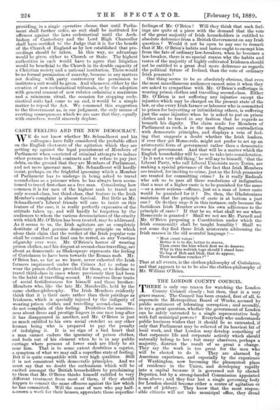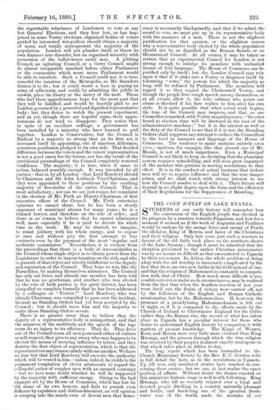THE LONDON COUNTY COUNCIL. T HERE is only one reason for
watching the London County Council closely ; but then, that is a very grave reason. The Council has been created, first of all, to supersede the Metropolitan Board of Works, accused by public sentiment of tolerating corruption ; and secondly, to try a great question, whether the government of London can be safely entrusted to a single representative body with full municipal powers ? Everybody who understands public business wishes that it should be so entrusted, if only that Parliament may be relieved of its heaviest bit of local work, and that London may develop something of that corporate life and corporate activity which should naturally belong to her ; but many observers, perhaps a majority, distrust the result of so great a change. They say the work is too great for the men who will be elected to do it. They are alarmed by American experience, and especially by the experience of Washington, now becoming the pleasantest place of residence in the Union, and developing rapidly into a capital because it is governed not by elected Deputies, but by a strong-handed Commission appointed from above ; and they fear lest a single governing body for London should become either a centre of agitation or a nest of jobbery. They know that the most respon- sible citizens will not take municipal office, they dread the regrettable reluctance of Londoners to vote at any but General Elections, and they fear lest, as has hap- pened in some Vestry elections, organised bodies of voters guided by interested wirepullers should obtain a majority of seats, and totally misrepresent the majority of the population. London will not plunder itself, or throw its own finances into disorder, but an organised minority with possession of the ballot-boxes easily may. A jobbing Council, an agitating Council, or a viewy Council might do almost irreparable mischief before either Parliament or the community which must move Parliament would be able to interfere. Such a Council could not, it is true, remodel the taxation of the Metropolis, as Mr. Saunders desires it to do ; but it could waste a loan in paying an army of adherents, and could, by admitting the public in crowds, place its liberty at the mercy of the mob. Those who feel these apprehensions hope for the most part that they will be falsified, and would be heartily glad to see London governed by a powerful and dignified representative body ; but they desire to watch the present experiment, and as yet, though there are hopeful signs, their appre- hensions do not tend to disappear. They notice that, in spite of an excellent suffrage, a government has been installed by a minority who have learned to pull together. London is Conservative, but the Council is Radical by a majority so strong that, as its first act, it increased itself by appointing, out of nineteen Aldermen, seventeen gentlemen pledged to its own side. That decided difference between the voters and the voters' representatives is not a good omen for the future, nor has the result of the provisional proceedings of the Council completely restored confidence. The majority, it is true, when it came to action, behaved sensibly enough. It was intended by all parties—that is, by all London—that Lord Rosebery should be Chairman and Sir John Lubbock Vice-Chairman, and they were appointed to those positions by the crushing majority of five-sixths of the entire Council. That is most satisfactory ; nor can we see just reason for complaint in the election of Mr. Firth as Deputy-Chairman, or first executive officer of the Council. Mr. Firth entertains opinions we cannot share, but he has been a steady opponent of municipal abuses for many years ; he is a trained lawyer, and therefore on the side of order ; and there is no reason to believe that he cannot administer well, more especially if he is paid to devote his whole time to the work. He may be trusted, we imagine, to resist jobbery with his whole energy, and to expose at once and without pity the first attempt to buy contracts even by the payment of the most " regular and moderate commission." Nevertheless, it is evident from the proceedings that there is a body of irreconcilables in the Council whose single object is to obtain power from the Legislature in order to impose taxation on the rich, and who in pursuit of that object are utterly indifferent to the dignity and reputation of the Council. They hope to win, like the Parnellites, by making themselves nuisances. The Council has only sat twice, and already one member has been told that he was no gentleman, and another, who was elected by the vote of both parties in his great district, has been compelled to complain formally that he has been addressed by a colleague as " Traitor !" Lord Rosebery, who was already Chairman, was compelled to pass over the incident, because no Standing Orders had yet been accepted by the Council ; but it should warn him and the majority to make those Standing Orders severe.
There is no greater error than to believe that the dignity of a representative body is unimportant, and that the manners of the multitude and the speech of the tap- room do no injury to its efficiency. They do. They drive out of the Council-room all men possessed either of culture or self-respect, they give to any sweep who may happen to be elected the means of securing influence by terror, and they destroy the first object of representation, which is that the representatives may reason calmly with one another. We have no fear but that Lord Rosebery will exercise the authority which will be vested in him—unless, indeed, he yields to the permanent temptation of clever aristocrats to regard the colloquial antics of rougher men with an amused contempt —but we have some doubt whether he will be supported by the majority with sufficient energy. Owing to the bad example set by the House of Commons, which has lost its old sense of its own honour, and fails to punish even defiance by expulsion and disfranchisement, an evil opinion is creeping into the minds even of decent men that demo- cracy is necessarily blackguardly, and that if we admit the crowd to vote, we must put up in its representative body with the manners of a mob. There is not the slightest justification for that opinion, or the slightest reason why a representative body elected by the whole population should not be as dignified as the Roman Senate or an (Ecumenical Council. At all events, it may be taken as certain that an experimental Council for London is not strong enough to indulge its members with unlimited license of foul language. The House of Commons can be purified only by itself ; but the London Council may rely upon it that if it sinks into a Vestry or disgraces itself by tolerating " rows," the powers for which the majority so long will be refused by Parliament. The members will regard it as they regard the Clerkenwell Vestry, and though the people love rough speech among themselves, or at all events allow it, the very cabman who pours out abuse is shocked if his fare replies to him after his own style. It is quite possible that when actual work begins, the tone of the Council may improve, and that, as one Councillor remarked, with Vestry magniloquence, " the cries heard at election time will be drowned in the roar of the administrative machine ;" but it is the interest as well as the duty of the Council to see that if it is not, the Standing Orders shall suppress any attempt to reduce the Councillors to the level in manners and language of the House of Commons. The tendency to make motions entirely extra vires,—motions, for example, like that absurd one of Mr. Maude, is not of much importance. Even a Municipal Council is not likely to keep on declaring that the planetary system requires remodelling, and will soon grow impatient of the member who persists in moving resolutions to that effect. It is in the conduct of actual business that violent men will try to acquire influence and that the true danger arises, and we shall watch with strong interest to see how the Council resolve to deal with it. Their future will depend in no slight degree upon the form and the efficiency of their Regulations for the Suppression of Brawling.







































 Previous page
Previous page